Choosing the right email marketing platform is like finding the perfect pair of shoes — it needs to fit just right. If you’re considering Sender alternatives, you’re probably looking for something that better suits your needs.
While Sender is a solid email marketing software, you might be after features like advanced automation, CRM integration, or maybe a more budget-friendly plan.
In this article, we’ll look into some of the top Sender alternatives. We’ll compare them based on features, pricing, and the types of businesses they’re best suited for.
By the end, you’ll have a better idea of whether it’s time to switch or stick with what you’ve got.
Table of Contents
What Sender offers: strengths and limitations
Before we get into the alternatives, let’s take a closer look at Sender and why you might be considering other options.
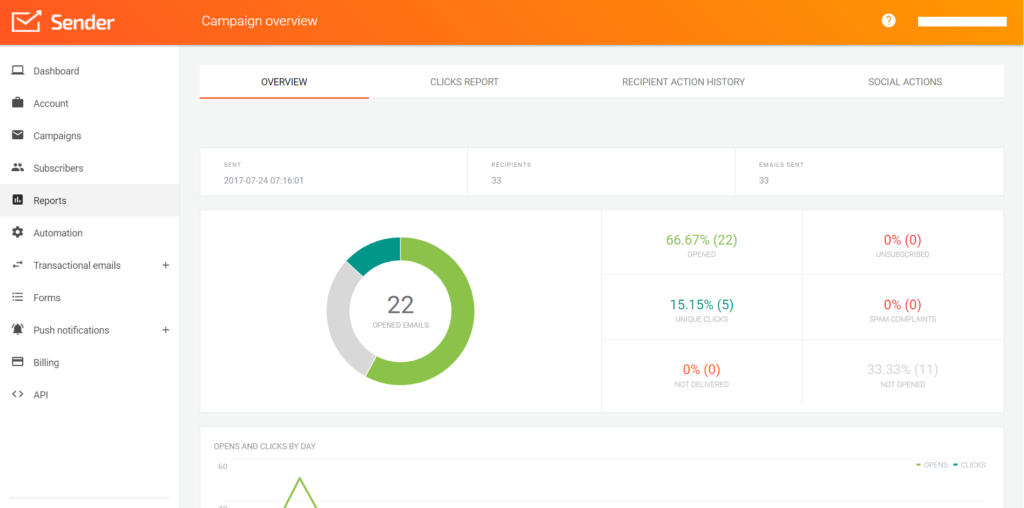
Strengths
- Easy to use. The drag-and-drop editor makes it easy to design emails without needing coding skills.
- Basic automation. Supports basic automation workflows and autoresponders, enough for small businesses to stay in touch with their audience.
- Audience segmentation. Lets you segment your email lists based on various criteria for targeted campaigns.
- API and integrations. Connects with CMS platforms like WordPress and Shopify.
- Analytics. Provides metrics to track email campaign performance.
Limitations
- Limited advanced features. As your business grows, you may find Sender’s automation and CRM capabilities insufficient.
- Basic A/B testing. Doesn’t offer more detailed testing options that some businesses might need.
- Fewer integrations. Has fewer third-party integrations compared to some competitors, which could limit your marketing stack. For example, it may not directly integrate with tools like Salesforce, Zapier, or Magento.
- Scalability. Might not be the best fit for larger enterprises with complex marketing needs.
- No landing page builder. You’ll need to use another tool if you require landing pages.
Best for
Small businesses that need basic to moderate features.
Pricing
- Free plan. Up to 15,000 emails/month with 2,500 subscribers.
- Paid plan. Starts at $19/month for 30,000 emails and 2500 subscribers/month. Advanced features are available in higher tiers.
Best Sender alternatives compared
Now that we’ve reviewed what Sender can and can’t do, let’s look at some of the best alternatives that might better suit your needs.
1. Brevo
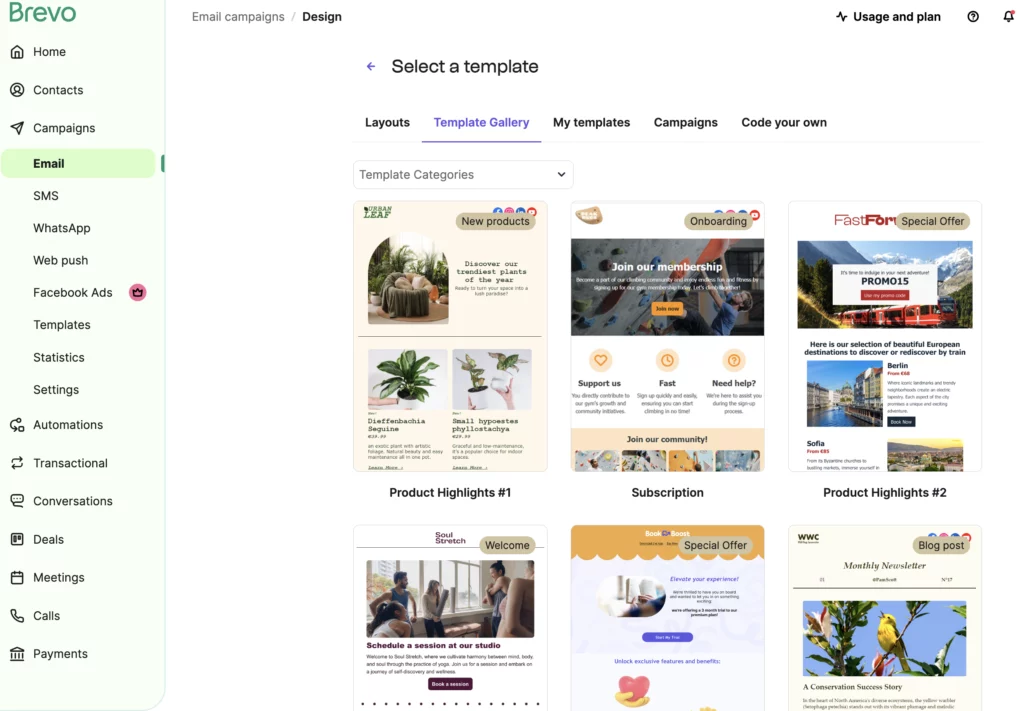
Why Brevo might be right for you
All-in-one marketing solution
It goes beyond email marketing, combining email, SMS, chat, and CRM tools in one place. This setup streamlines your processes, making it easier to manage everything from one place.
For those using platforms like Shopify or WooCommerce, the platform syncs smoothly. It offers useful features like abandoned cart reminders and post-purchase emails that help maintain customer engagement.
Simple and effective email marketing features
You can:
- Design emails using the intuitive drag-and-drop editor, free email templates, or an HTML editor.
- Target specific audience segments and personalize content.
- A/B test different email versions to see what works best.
- Use the AI email generator to write subject lines, email content, and optimize send times.
- Track your email performance with real-time insights, integrated with Google Analytics.
- Focus on deliverability to make sure your emails reach the intended inboxes, not spam.
Automation made easy
Brevo's automation tools help take repetitive tasks off your plate, letting you focus on other priorities.
You can set up workflows to automatically send emails based on user behavior, like welcome emails or follow-ups after certain actions. This keeps your marketing efforts running smoothly without manually managing every little detail.
Some of the marketing automation features include:
- Email autoresponders. Automatically send welcome messages and other emails.
- Pre-built templates. Customize ready-made templates to save time.
- Website tracking. Trigger emails based on how visitors interact with your site.
- If/then/else scenarios. Create smart workflows that adapt to your customer’s actions.
- Lead scoring. Focus your efforts on the most engaged leads.
- Omnichannel automation: Coordinate your campaigns across email, SMS, WhatsApp, and push notifications.
Built-in CRM for easy management
The built-in CRM keeps all your customer data and communication in one place. This makes it easier to manage relationships and track interactions without juggling multiple systems.
This setup makes it easier to stay on top of things and potentially close more deals.
Where Brevo might fall short
- Feature overload. If you only need basic email marketing, Brevo might offer more than you need.
"Great platform"
"The site is easy to navigate, straightforward, and has great functionalities. I have been using it for the last three years."
Andréanne Lefebvre,
Brevo user
Best for
Businesses of all sizes, but it truly shines for small to medium-sized businesses. It's a good choice if you’re looking for an affordable yet feature-rich platform, with strong marketing automation and CRM capabilities.
Pricing
- Free plan. Up to 300 emails/day for up to 100,000 contacts, providing a solid starting point.
- Paid plan. Starts from $9 with up to 5,000 emails/month with no daily sending limit. As your needs grow, the pricing stays reasonable, letting you access more features without a big jump in cost.
2. Klaviyo
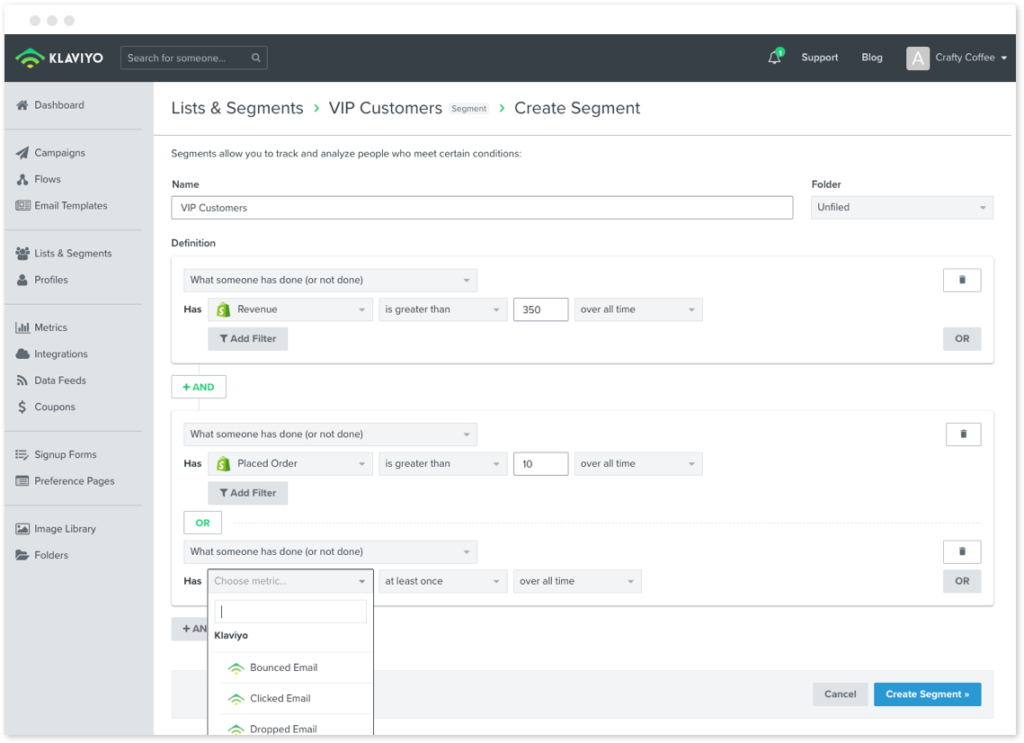
Why Klaviyo might be right for you
- Deep ecommerce integrations. It works well with platforms like Shopify and WooCommerce, offering detailed customer tracking.
- Advanced segmentation. Allows highly targeted segments based on customer behavior and preferences.
- Email automation. Offers pre-built workflows for common ecommerce tasks. These include cart abandonment, product recommendations, and post-purchase follow-ups.
- Analytics. Provides detailed analytics that gives you insights into campaign performance.
Where Klaviyo might fall short
- Expensive. Price increases quickly as your email list grows, which could be a challenge for businesses on a tight budget.
- Learning curve. The advanced features and deep integrations can be overwhelming if you’re new to email marketing. This makes it less suitable for beginners.
Best for
Ecommerce businesses that need deep integrations with their online store and advanced personalization capabilities.
Pricing
- Free plan. 500 emails/month for up to 250 contacts.
- Paid plan. Starts at $45/month for 15,000 emails/month and up to 1,500 contacts. If you’re on a budget, you might want to look into Klaviyo alternatives.
3. Mailchimp
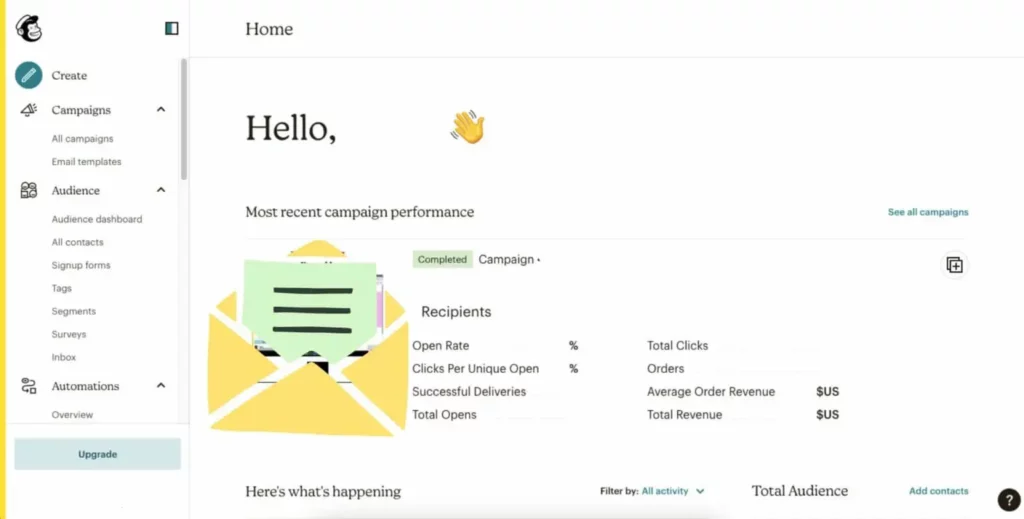
Why Mailchimp might be right for you
- All-in-one marketing platform. Offers email marketing, social media integration, and landing page creation.
- Ease of use. An intuitive drag-and-drop email builder, making it easy for beginners to design emails.
Where Mailchimp might fall short
- Higher costs for large lists. Pricing increases significantly with more contacts, making it expensive as your business grows.
- Limited tagging. It can’t tag contacts based on their actions, making segmentation difficult. For example, if someone opens an email sent via Mailchimp, it can’t tag that person as “opened” or “unsubscribed.”
If you need more precise targeting, consider Mailchimp alternatives.
Best for
Small businesses and startups looking for an all-in-one marketing platform.
Pricing
- Free plan. Basic features for up to 500 contacts.
- Paid plan. Mailchimp prices start at $13 per month.
4. HubSpot
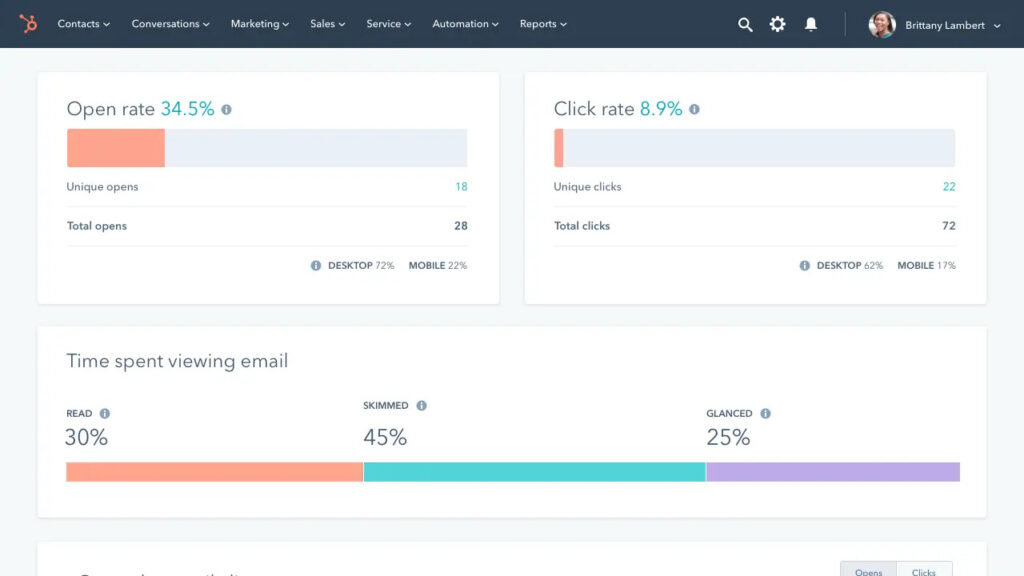
Why HubSpot might be right for you
- Full CRM integration. Combines CRM with its marketing tools, allowing you to manage customer relationships and marketing efforts from one platform.
- Marketing automation platform. Advanced features like workflow automation, lead nurturing, and triggered emails help streamline your marketing processes.
Where HubSpot might fall short
- Expensive. Higher tiers are pricier than other email platforms. For example, the second tier starts at $800/month for 2,000 contacts, making it costly for professionals.
- Complex setup. Getting everything set up, especially the advanced features, can take time and may require dedicated resources. This makes it less convenient if you’re short on time or technical know-how.
Best for
Businesses looking for an all-in-one marketing, sales, and CRM platform. It’s particularly beneficial for companies with complex marketing needs. If you’re looking for something simpler, you might want to consider HubSpot alternatives.
Pricing
- Free plan. Limited features.
- Paid plan. Starts at $20/month for 1,000 contacts. Cost increases significantly when features are added.
5. Mailerlite
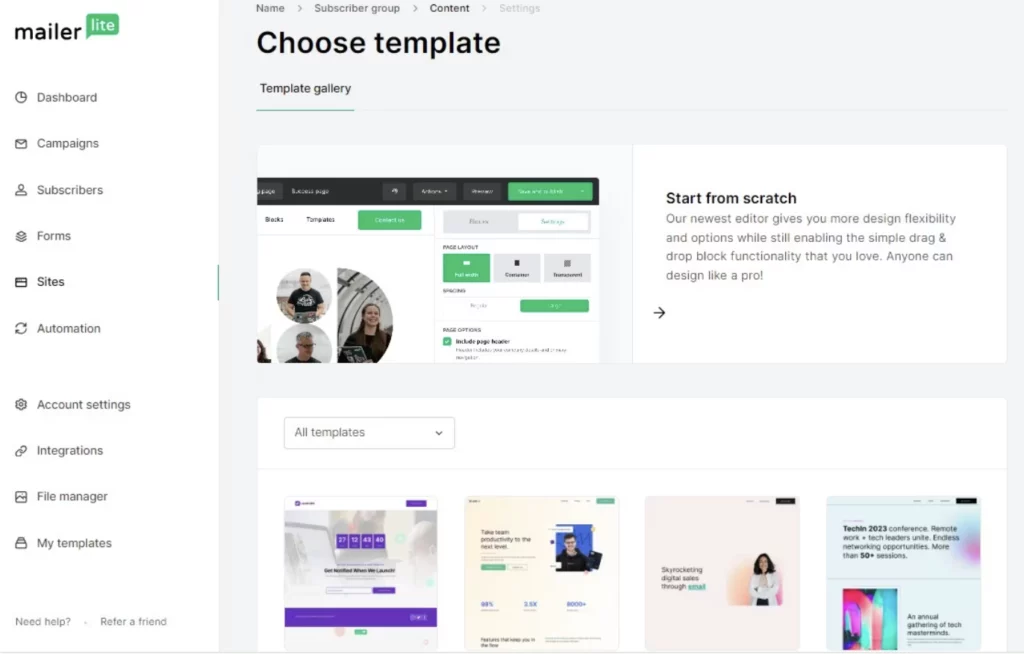
Why Mailerlite might be right for you
- Simple and affordable. Easy to use, with features tailored for small businesses.
- Landing page builder. Includes a built-in tool for creating landing pages, unlike Sender.
Where Mailerlite might fall short
- Basic automation. Not as powerful as some other platforms.
- Lack of CRM. If you need complete customer management, you'll need to integrate it with a separate CRM tool.
Best for
Small businesses, freelancers, and bloggers looking for a budget-friendly, easy-to-use email marketing tool with basic capabilities.
Pricing
- Free plan. Up to 1,000 subscribers with 12,000 emails/month.
- Paid plan. Starts at $10 per month.
Further reading: 10 MailerLite Alternatives for All Business Needs
6. Constant Contact
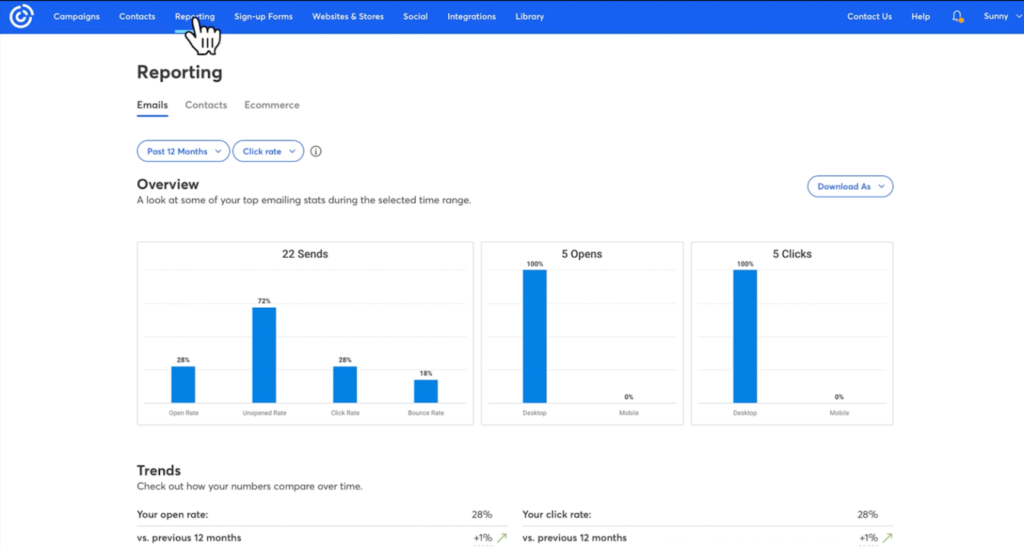
Why Constant Contact might be right for you
- Event management. Offers tools for creating and tracking events, which can be useful if you’re in an industry where events play a big role.
- Good customer support. Known for helpful phone and chat support.
Where Constant Contact might fall short
- No free plan. Unlike many competitors, it doesn’t offer a free tier, which might be a dealbreaker for businesses just starting out.
- Limited automation. The automation features are fairly basic compared to competitors. They might not be enough for more complex marketing strategies.
Best for
Small businesses and non-profits looking for an email marketing solution with event management capabilities.
Pricing
- No free plan. For free plan options, check out Constant Contact alternatives.
- Paid plan. Starts at $12 per month. Pricing increases based on the number of contacts and features you need.
7. Mailgun
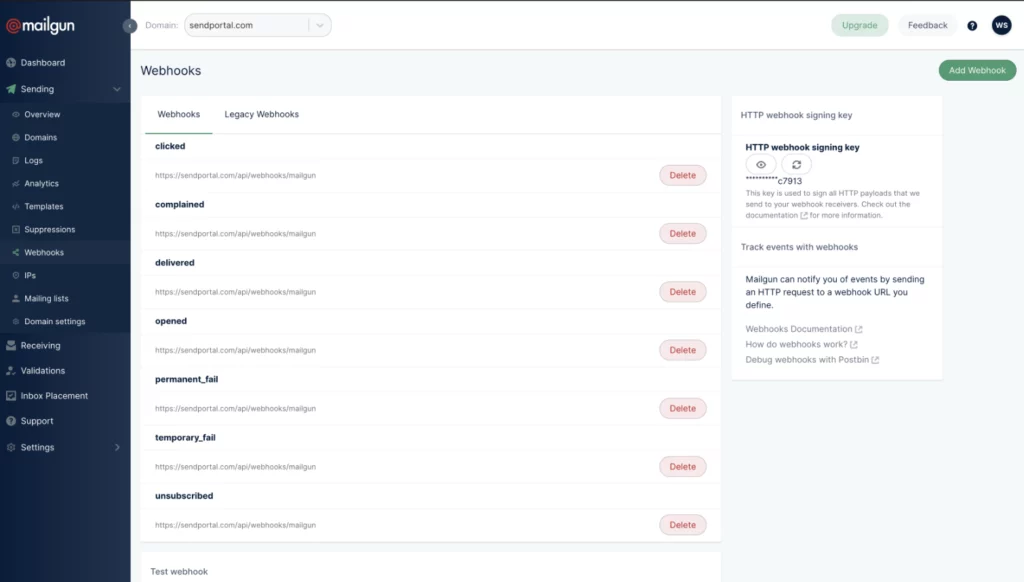
Why Mailgun might be right for you
- Transactional emails. Optimized for sending large volumes, making it ideal for ecommerce businesses that need to send millions of emails per month.
- Email API. Offers an advanced API that developers can use to send, receive, and track emails.
- SMTP relay. Allows email sending from your own servers, offering additional control over your email-sending processes.
Where Mailgun might fall short
- Not for beginners. It’s developer-focused, which may be challenging for non-technical users.
- Limited marketing tools. Isn’t designed as a full-fledged marketing platform, so it lacks many of the features found in other alternatives.
- Expensive for high volumes. As your email volume increases, the pricing becomes steep, especially when compared to more comprehensive platforms.
Best for
Developers and businesses that need a platform for sending transactional emails with advanced API capabilities. If this doesn’t fit your needs, explore Mailgun alternatives.
Pricing
- Free plan. 100 emails/day.
- Paid plan. Starts at $15/month for 10,000 emails/ month. Higher tiers are available for businesses with larger email volumes.
Choose the right Sender alternative
Each platform has its own unique features depending on your needs.
But in a nutshell:
Ready to make the switch?







